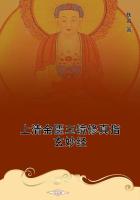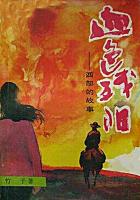So one fine morning in the spring they both set out along the road that led from Kioto to Osaka, one from one end and the other from the other. The journey was more tiring than they expected, for they did not know much about travelling, and half way between the two towns there arose a mountain which had to be climbed. It took them a long time and a great many hops to reach the top, but there they were at last, and what was the surprise of each to see another frog before him! They looked at each other for a moment without speaking, and then fell into conversation, explaining the cause of their meeting so far from their homes. It was delightful to find that they both felt the same wish--to learn a little more of their native country--and as there was no sort of hurry they stretched themselves out in a cool, damp place, and agreed that they would have a good rest before they parted to go their ways.
'What a pity we are not bigger,' said the Osaka frog; 'for then we could see both towns from here, and tell if it is worth our while going on.'
'Oh, that is easily managed,' returned the Kioto frog. 'We have only got to stand up on our hind legs, and hold on to each other, and then we can each look at the town he is travelling to.'
This idea pleased the Osaka frog so much that he at once jumped up and put his front paws on the shoulders of his friend, who had risen also. There they both stood, stretching themselves as high as they could, and holding each other tightly, so that they might not fall down. The Kioto frog turned his nose towards Osaka, and the Osaka frog turned his nose towards Kioto; but the foolish things forgot that when they stood up their great eyes lay in the backs of their heads, and that though their noses might point to the places to which they wanted to go their eyes beheld the places from which they had come.
'Dear me!' cried the Osaka frog, 'Kioto is exactly like Osaka.
It is certainly not worth such a long journey. I shall go home!'
'If I had had any idea that Osaka was only a copy of Kioto Ishould never have travelled all this way,' exclaimed the frog from Kioto, and as he spoke he took his hands from his friend's shoulders, and they both fell down on the grass. Then they took a polite farewell of each other, and set off for home again, and to the end of their lives they believed that Osaka and Kioto, which are as different to look at as two towns can be, were as like as two peas.
[Japanische Marchen.]
THE STORY OF A GAZELLE
Once upon a time there lived a man who wasted all his money, and grew so poor that his only food was a few grains of corn, which he scratched like a fowl from out of a dust-heap.
One day he was scratching as usual among a dust-heap in the street, hoping to find something for breakfast, when his eye fell upon a small silver coin, called an eighth, which he greedily snatched up. 'Now I can have a proper meal,' he thought, and after drinking some water at a well he lay down and slept so long that it was sunrise before he woke again. Then he jumped up and returned to the dust-heap. 'For who knows,' he said to himself, 'whether I may not have some good luck again.'
As he was walking down the road, he saw a man coming towards him, carrying a cage made of twigs. 'Hi! you fellow!' called he, 'what have you got inside there?'
'Gazelles,' replied the man.
'Bring them here, for I should like to see them.'
As he spoke, some men who were standing by began to laugh, saying to the man with the cage: 'You had better take care how you bargain with him, for he has nothing at all except what he picks up from a dust-heap, and if he can't feed himself, will he be able to feed a gazelle?'
But the man with the cage made answer: 'Since I started from my home in the country, fifty people at the least have called me to show them my gazelles, and was there one among them who cared to buy? It is the custom for a trader in merchandise to be summoned hither and thither, and who knows where one may find a buyer?'
And he took up his cage and went towards the scratcher of dust-heaps, and the men went with him.
'What do you ask for your gazelles?' said the beggar. 'Will you let me have one for an eighth?'
And the man with the cage took out a gazelle, and held it out, saying, 'Take this one, master!'
And the beggar took it and carried it to the dust-heap, where he scratched carefully till he found a few grains of corn, which he divided with his gazelle. This he did night and morning, till five days went by.
Then, as he slept, the gazelle woke him, saying, 'Master.'
And the man answered, 'How is it that I see a wonder?'
'What wonder?' asked the gazelle.
'Why, that you, a gazelle, should be able to speak, for, from the beginning, my father and mother and all the people that are in the world have never told me of a talking gazelle.'
'Never mind that,' said the gazelle, 'but listen to what I say!
First, I took you for my master. Second, you gave for me all you had in the world. I cannot run away from you, but give me, Ipray you, leave to go every morning and seek food for myself, and every evening I will come back to you. What you find in the dust-heaps is not enough for both of us.'
'Go, then,' answered the master; and the gazelle went.
When the sun had set, the gazelle came back, and the poor man was very glad, and they lay down and slept side by side.
In the morning it said to him, 'I am going away to feed.'
And the man replied, 'Go, my son,' but he felt very lonely without his gazelle, and set out sooner than usual for the dust-heap where he generally found most corn. And glad he was when the evening came, and he could return home. He lay on the grass chewing tobacco, when the gazelle trotted up.
'Good evening, my master; how have you fared all day? I have been resting in the shade in a place where there is sweet grass when I am hungry, and fresh water when I am thirsty, and a soft breeze to fan me in the heat. It is far away in the forest, and no one knows of it but me, and to-morrow I shall go again.'















